|
– Part 1: The Films –
The first Columbia Noir box set from Indicator was one of my favourite disc releases of 2020 and I was thus really looking forward to getting my hands on this second set, despite being fully aware that watching and writing about everything it contained would swallow up almost all of my free time for a good two weeks. And a good two weeks it’s been, in every sense. Once again we have six too-little seen noir films from Columbia’s archive, each remastered and with an accompanying commentary and other relevant supplementary material. Personal taste will play a part, of course, but for me, this time around there are two absolute belters, two strong works that actually improve with subsequent viewings, one lesser but still entertaining title, and one genuinely extraordinary feature that was a big influence on a certain well-known American filmmaker. Once again, each of the films is accompanied by a Three Stooges short. I’m still not sure what the thinking was behind this idea, but I have to admit to having become rather fond of it, and a couple of the films included here are pretty darned funny, and I’m talking from the perspective of someone few would label as a Stooges fan.
As usual, I’ve watched and reviewed each of the included films separately in chronological order and completed each review before watching any of the special features. I only made alterations to them after immersing myself in this supplementary material when points of which I was unsure of were clarified or information was revealed that I thought pertinent to include. It’s no spoiler to state even before we get going that if you’re a fan of 40s and 50s film noir then you’re in for another treat here, but if you need further persuading, please read on.
As with the previous box set, I’ve covered the films first and the technical specifications and special features for all six discs on a second page.
How often have you seen this sequence in a movie? A lone individual is driving down a winding mountain road when the brakes of their vehicle fail and they have to wrestle with the steering wheel to avoid skidding off of the road and plunging down the hillside to an explosive death. Plenty of times, right? But how many films have you seen where this is the opening sequence, and where the vehicle is already out of control as the film begins? So it is with the 1947 Framed, which kicks off with Mike Lambert (Glenn Ford) struggling to keep his speeding truck on the road as he navigates dangerous corners that are bordered by perilous drops. Somehow, he makes it into town and eventually manages to bring the vehicle to a halt right outside the premises of the company that hired him, pranging a vehicle owned by local man Jeff Cunningham (Edgar Buchanan) in the process. Jeff demands compensation for his damaged fender, but company manager (Charles Cane) refuses to pay up. Mike tells him he should, as the accident was the result of faulty brakes on the company vehicle, and when the manager still refuses, Mike forcefully demands his wages and gives most of the money to Jeff to pay for his repairs. What seems at first like a throwaway encounter designed solely to introduce Mike and tell us a little about him – which indeed it does – proves to be much more as the story unfolds. Indeed, Framed is a film in which just about every action and encounter has both a primary and secondary function, advancing the plot but connecting with its later development in sometimes surprising ways.
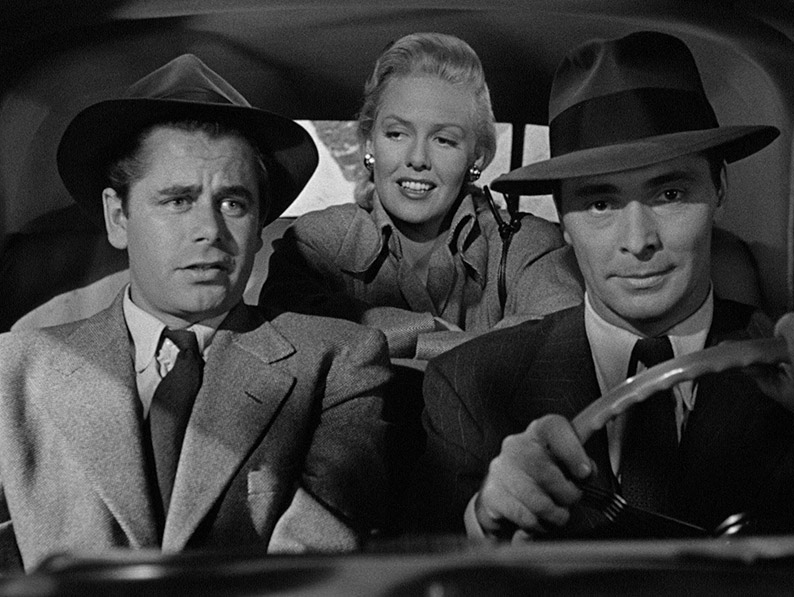
As soon as Mike enters the La Paloma Café, he’s eyed-up by glamorous blonde waitress Paula Craig (Janis Carter), and I doubt there are many watching the film as part of a noir box set who don’t immediately smell a small but seductive rat. I’m not saying Glenn Ford wasn’t a good-looking guy, but quite why Paula is so instantly taken with him is at this point uncertain and just a little suspicious. A short while later, a gaggle of policeman stride in to arrest Mike on charges made by the trucking company manager, to which they are quickly able to add driving on an expired licence. Given the choice by the judge of a 50 dollar fine or ten days in jail, the weary Mike admits that he doesn’t have 50 dollars, but is just being led away when the watching Paula offers to pay the fine. What, exactly, is this woman up to?
Back at the La Paloma, Mike gets so drunk that he almost falls unto a stupor and ends up being half-carried to a boarding house and dumped on a bed to sleep it off by Paula. After leaving some money in Mike’s wallet, she heads briskly to her own place, changes her clothes and hairstyle and meets up with Steve Price (Barry Sullivan), whom she clearly knows well. Her first words to Steve are “I’ve found him,” an ominous statement that triggers an appropriately sinister chord of music. It quickly becomes clear that Mike has been selected because of his physical similarity to Steve. That he looks nothing like him facially doesn’t seem to bother Steve. “Doesn’t matter,” he says matter-of-factly, “we’ll fix that.”
It’s the first ‘what the hell?’ twist in a film that is littered with them, and given that this is one of the film’s principal pleasures I’m reluctant to get into where the plot goes next in any detail. That Paula and Steve are planning to set Mike up to take the rap for a crime they plan to commit will come as no surprise given that the film’s past tense title confirms this will happen, and that there’s more to their plan than a simple frameup is hinted at early and is confirmed shortly before another of the film’s ‘gotcha!’ moments. That Mike is even the central character is called into question at one point when he is temporarily side-lined to focus on Paula and Steve, whose plans are then temporarily disrupted when the reawakened Mike finds the very sort of job opportunity he came to town in search of in the first place, and it’s here that the first of the open story threads begin to connect. By this point we’ve come to realise that beneath his sometimes gruff exterior, Mike is actually a decent guy and thus the one we definitely should be rooting for. Yet at the same time, despite their criminal scheming and willingness to screw Mike over, Paul and Steve are not initially presented as innately evil people, which gives them a third dimension too-often absent from the nominal villains of such films. In a different movie, we might well be rooting for them to succeed in whatever their plans may be.
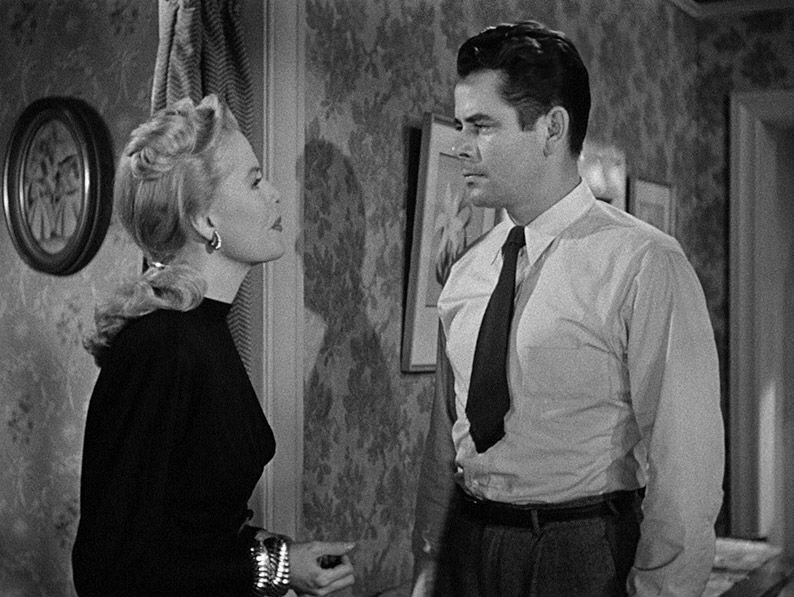
The film times its twists impeccably, often revealing key information only when it will impact on the story development – we discover what Mike does for a living, for example, at the very moment this can impact on Mike’s future plans – and using them to repeatedly redirect the path of the story. I lost count of the number of times I was genuinely caught out by a turn the plot had taken, and with a couple of notable exceptions that may have interesting alternative explanations, none of them seriously strain credibility.
Glenn Ford, who was so good in The Undercover Man in Columbia Noir #1, makes the first of his two appearances in this set and once again proves his worth as a solid and ultimately likable leading man, while Janis Carter makes for deliciously unpredictable and dangerous femme fatale, a glamorous and seductive blonde whom you couldn’t even trust to make you a non-lethal coffee. Barry Sullivan somehow finds a degree of humanity in Steve Price, even when he’s making sinister plans against Mike, and I took a very quick liking to Edgar Buchanan’s portrayal of Jeff Cunningham, a character whose story I was quietly aching to see resolved but which is left to us to finish off in order to facilitate a suitably cynical final line of dialogue.
If you’re watching the films in chronological order as I did, Framed is a belter of an overture for this second Columbia Noir box set, one that starts with a bang and is designed to keep you on your toes with a whole string of perfectly timed turns of fate. Director Richard Wallace, previously best known for his comedies and the Douglas Fairbanks action adventure, Sindbad, the Sailor, keeps things moving at a busy lick, and is aided by a tightly constructed screenplay by Blood on My Hands and The Asphalt Jungle writer Ben Maddow, another contributor to more than one of the films here. Having been so captivated by the films in Indicator’s first Columbia Noir box set, I had wondered if the second one could even come close, and watching Framed quickly put any such doubts to rest.
Mal Granger (Edmond O'Brien) is an easygoing Los Angeles telecommunications engineer who supplements his wages by making race bets with bookie Chippie Evans (Sammy White), who surreptitiously conducts his business in the company washroom. Mal’s betting instincts are not as strong as his knowledge of electronic communication equipment, and after he suffers another loss, the friendly Chippie suggests that a man with his technical skills could make good money if he worked for the right people. Chippie then introduces him to one of the people in question in the shape of Vince Walters (Barry Kelley), who runs an illegal racing wire service that supplies a network of bookies with up-to-date information on the races that their customers are gambling on. Mal convinces Vince that he can rig up an electronic system that will greatly increase the efficiency of the process and is promptly offered the job on a far better wage than he currently makes. It’s then that Mal meets Vince’s business partner, Trudy Maxwell (Dorothy Patrick), who meets genre expectations for sassy blondes when she responds to Mal’s smiling offer to listen to her ideas about the this basement’s lack of air conditioning with the line, “My, you’ve got a new approach. First guy I ever met that made air conditioning sound like etchings.”
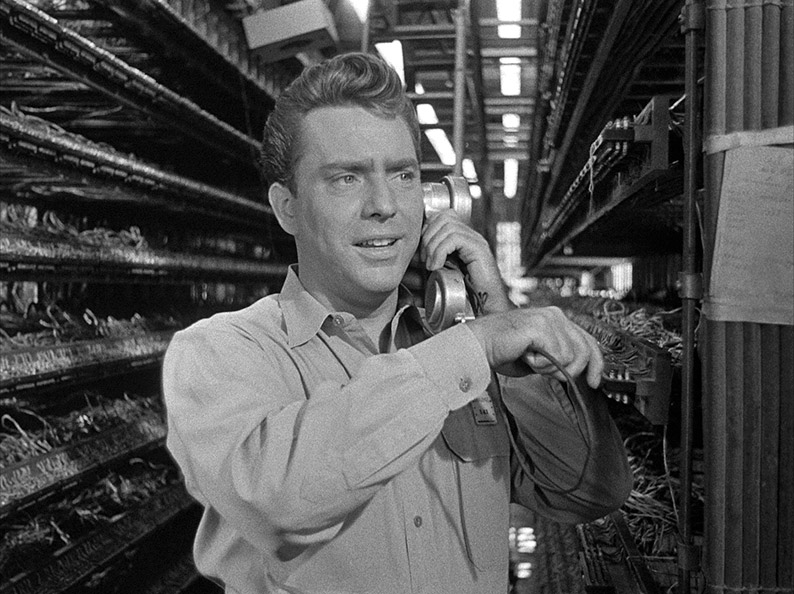
Mal’s immediate future appears to be laid out, a new job helping to run an illegal but lucrative wire service and a woman who he clearly has plans to pursue. There’s just one thing – the film doesn’t begin with Mal helping a workmate out by donating a few bucks from his winnings – which he does – but with Lieutenant Pete Wright (Howard St. John) heading out to arrest Mal for murder and looking back at how a man like him could have ended up in this mess. It’s an ominous start that actually slipped my mind until Pete comes back into the story when he is hired for the Naked Gun-esque sounding Gangster Squad and is charged with looking into the illegal Los Angeles race wire services with the aim of putting them all out of business. This strand of the story was likely inspired by the California State Attorney General Earl Warren’s campaign against illegal gambling in 1939, while a later incident in which a bookie runs wild with a gun and is later found dead in his car from an apparently self-inflicted gunshot wound recalls the real-world death of bookmaker Weldon “Duckie” Irvin the previous year. The film even opens with a textual scroll claiming that powerful criminal elements attempted to stop this film being made because of the information it reveals, but the general opinion is that this was either claptrap or a greatly exaggerated version of the truth employed to give the film an extra layer of authenticity. Frankly, it already does rather well on this score. Mal goes to great pains to explain the workings of the devices he comes up with to give Vince an edge and all seem to be based on real or emerging technology, or at the very least have a basis in scientific fact. Yet despite being instrumental in the considerable expansion of Vince’s business, the ambitious Mal is still paid a regular employee’s wage, so develops a plan to get a larger slice of the cake, one that propels him upwards to the point where he attracts the interest not just of Pete and his colleagues, but the head of a powerful interstate criminal syndicate.
There’s more than a whiff of old-school, rise-and-fall gangster movies to 711 Ocean Drive. It’s Scarface without the guns, if you will, a twice-told gangster tale of a lowly foot soldier who rises to become the head of a criminal organisation, one that Hal’s journey up the criminal empire ladder shares a few key story beats with. If there’s a downside to this it’s that over the course of the story Hal goes from being an enthusiastic and likeable guy to a self-absorbed dick who puts business before everything, including Trudy, whom he keeps at an emotional distance due to his disinterest in being tied down. This all changes once Carl Stephans (Otto Kruger), the head of the powerful Cleveland-based National Wire Service, takes an interest in acquiring Mal’s operation. He sends his top lieutenant, Larry Mason (Donald Porter), to make Mal an offer he really shouldn’t refuse. He cannily insists that Larry take his wife Gail (Joanne Dru) along too, clearly aware that she’s a spectacular flirt who’s lost all interest in her husband and is thus likely to latch on to Mal and help grease the wheels of the deal. This unfolds in a short but fascinating scene in which stock characters are given a fresh coat of paint and their criminal organisation conducts its affairs in the manner of a legitimate business corporation. Today, of course, the reverse has become true. As played by Otto Kruger, Stephans is not a Capone-like mob leader but a polite and rather oily senior manager who conducts business meetings with his lieutenants in the corporate boardroom of a modern office block and assigns unpleasant tasks with smiles and allusions. When the matter of a bookie who has been ripping them off is raised and it is agreed that an example should be made of him, for example, Stephans assigns the job to Steve (Bert Freed), a bulky brute who wears his glasses at an unusual tilt, by noting, “I think he’s a very sick man – I don’t believe he’ll ever get well,” which prompts the icy response, “I’ll see that he doesn’t.”
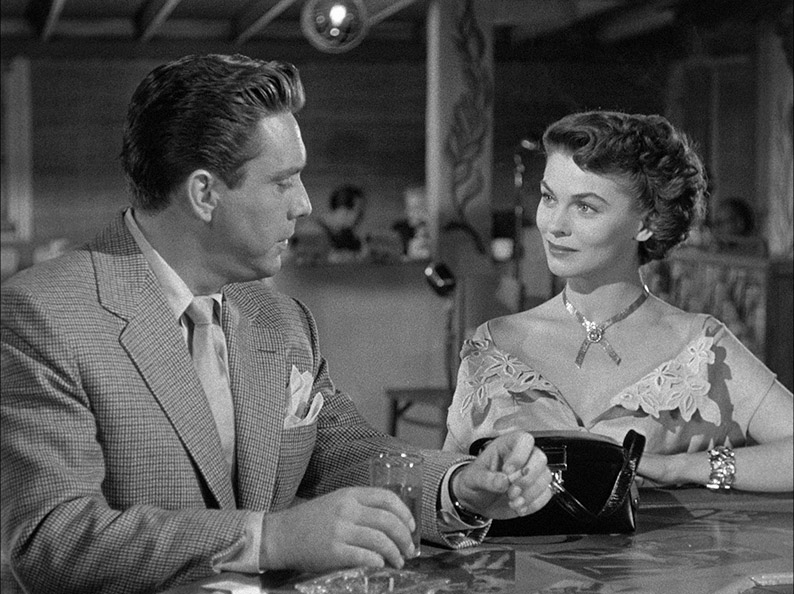
Once Mal and Gail start falling for each other, the enforced morality of Hollywood of the day effectively seals Mal’s fate, and hanging over his head is that opening warrant for his arrest for a murder he has yet to commit. It all builds to a climax of Hitchcockian scale, if not Hitchcockian tension, that was clearly shot on location at the Boulder (now Hoover) Dam, a sequence I couldn’t help thinking goes on for longer than required because director Joseph M. Newman wanted to make the best of this once-in-a-film-career opportunity. It’s still well handled, though does come to an (almost) inevitable end, then the film itself concludes in the manner of a public information film by making sure everyone watching knows that the seemingly innocent two-dollar bet they make is actually funding organised crime. While the intention was obviously to dissuade the viewing public from gambling, it inadvertently makes the case for legalising it.
Police Detective Johnny Damico (Broderick Crawford) is walking home after buying an engagement ring for his girlfriend Mary (Betty Buehler) one evening when he hears two gunshots and turns to find a man examining a body. He pulls his gun and confronts the man, who freely surrenders his own weapon and identifies himself as Lieutenant Henderson of the 21st Precinct, tossing his badge to Johnny so he can check his credentials. The dead man is identified as Tony Rogers and apparently shot one of Henderson’s colleagues about two hours early, and while Johnny checks the body, Henderson nips into a nearby shop to call for backup. It quickly arrives, but the patrolmen claim to know nothing about the shooting and only stopped because they were driving past. When Johnny checks the shop that Henderson entered he discovers that he made no phone call and instead ran straight out the back way.
When he calls his immediate superior, Lieutenant Banks (Otto Hulett), to report the incident and admit his mistake, Johnny is ordered to return immediately to headquarters. Here it’s confirmed that the man he inadvertently let go was no policeman and that the badge he showed Johnny was taken from the body of Lieutenant Meary, who was murdered by the same man three hours earlier, an incident Johnny was unaware of because he was off-duty. The dead man in the street was Edward Jensen, a principal witness in the Grand Jury investigation of waterfront rackets, while Lieutenant Meary was a Special Investigator assigned to the case. The Police Commissioner (Ralph Dumke) and the District Attorney (Carleton Young) are about as happy with Johnny as his disgruntled boss, though given that his mistake was an honest if unfortunate one, there was really no need for the belittling mockery they throw in his direction. They offer Johnny a chance to redeem himself by going undercover as dock worker Tim Flynn, and send him to New Orleans to work his way back to New York as a crewman on a ship and make as much noise as he can while doing so. This is designed to make sure that he arrives with a bit of rep, then try to land a job on the waterfront and start looking into the identity of a criminal boss known as Blackie Clegg.
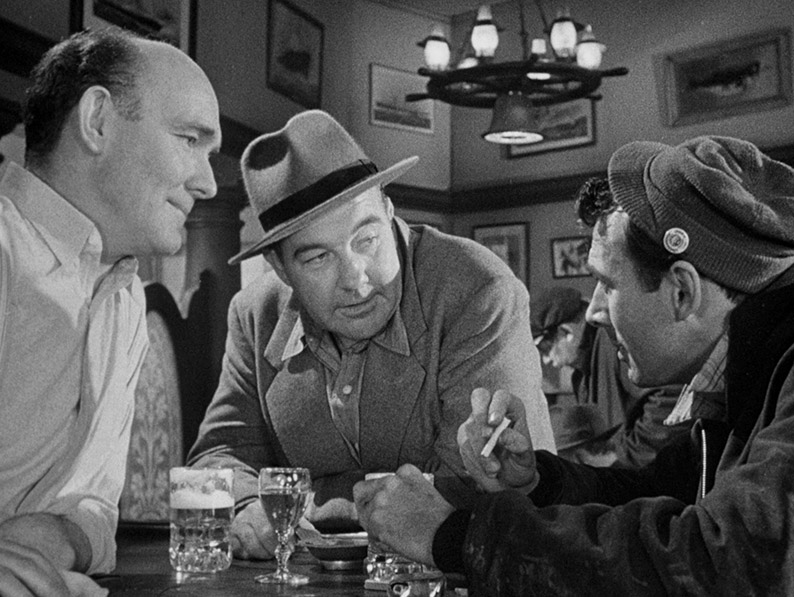
When Johnny alights from the boat on which he has worked his passage, he’s clearly done enough to thoroughly piss off his foreman, whose loud complaints attract the attention of a nearby group of dockworkers, whom Johnny then light-heartedly insults. He checks into a boarding house whose disinterested desk clerk (Jay Adler) has to be almost prised out of his chair to respond to Johnny’s bell rings, then sits himself down in the establishment’s bar, where he orders a white wine and a beer, which apparently is – or rather was once – a popular drink combination way down in New Orleans. This fact is recognised by Tom Clancy (Richard Kiley), a dockworker who is already seated at the bar and it proves to be a useful conversation starter for the two. Johnny asks Tom about the chance of work on the waterfront, and while Clancy does suggest that even with a New Orleans union card his chances are slim, it’s a subject he otherwise seems reluctant to discuss. When Johnny applies for a visitor’s work permit anyway he is told in no uncertain terms that there’s no chance of a job, but after the clerk takes a look at the name on his union card, Johnny finds himself signed up for waterfront work the very next day. When he improvises a response a question asked by mob money collector Tony (John Marley) about his boss Joe Castro (Ernest Borgnine), he’s quickly promoted to the role of forklift operator, which lands him in a fight with the man he replaces. Later, it gets him into bigger trouble when he’s stopped in the street by an enforcer named Gunner (Neville Brand) and taken to see Castro, where he quickly learns that there are some people it’s best not to cross.
It’s a solidly handled setup for an investigation that you just know is going to place Johnny in peril at one point or another, particularly as he dodged an attempt on his life even before he departed for New Orleans through a combination of instinct and good police work. What helps to make all this believable from an early stage is Broderick Crawford, who once shorn of his moustache and dressed in working man’s clothing, looks and sounds every inch the gruff, overweight blue-collar guy that his fellow dockworkers take him for. Engagement is enhanced by a smart and sassy screenplay by Support Your Local Sheriff! writer William Bowers (from a novel by Ferguson Findley, who receives a story credit here), who peppers the tightly plotted story with offbeat and engaging character details and dialogue exchanges. It’s this, coupled with director Robert Parish’s punchy, waste-free direction, and Joseph Walker’s moody monochrome cinematography (which makes great use of the Academy frame) that makes the film one of the best in this set. Supporting roles are also nicely cast and played here, with a convincingly intimidating early role for Ernest Borgnine as mobster Joe Castro, though for sheer brutal menace he’s outshone by Neville Brand as Gunner, the sort of sociopathic criminal foot soldier who’ll smilingly play word games with your pleas and then beat you senseless for having the stupidity to respond in kind. The sequence in which he, Castro and an uncredited second goon interrogate Johnny is genuinely tense and fraught with the threat of unspeakable violence. And Castro is not the only one Johnny has to be wary of in a town where the police are not above torturing their suspects for information. Richard Kiley makes for a convincingly easy-going Tom Clancy, who over time becomes Johnny's only waterfront friend, while Matt Crowley sells hotel barman Smoothie as a likeable ear for troubles who also may know more than he initially lets on.
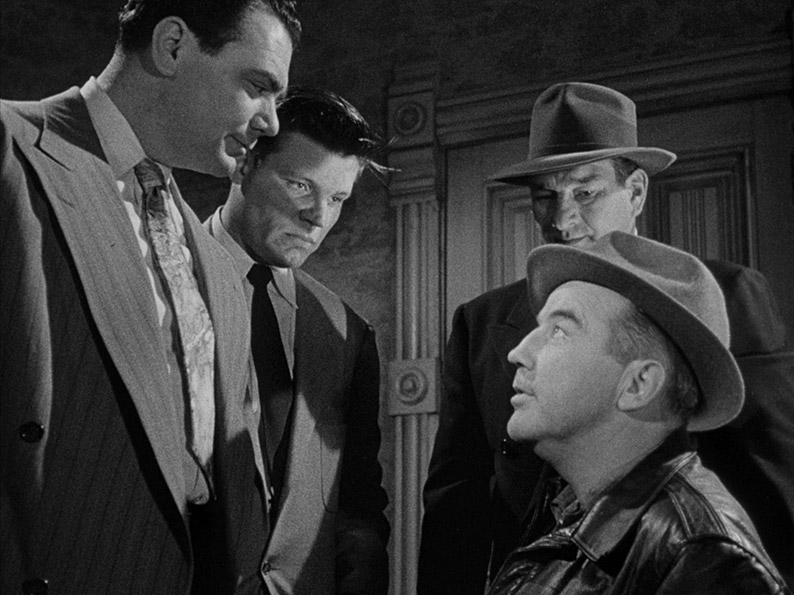
This balancing act of a cop who knows how to handle himself pitted against an organisation that could have him rubbed out in a heartbeat is part of what makes The Mob work as well as it does. The script is peppered with smart one-liners and engagingly offbeat asides (“Yeah, that’s a great town, New Orleans,” muses Clancy when he and Johnny first meet, “I had a girl there once, used to play the piano with her teeth”), and not all of the economically drawn supporting characters turn out to be who they initially seem. A tightly plotted, smartly directed and compellingly performed crime drama with a couple of nicely handled twists and almost documentary-like dockland location work, it’s a very male movie that may lack a sharp-talking femme fatale, but in all other respects is everything a no-nonsense noir drama should be.
| AFFAIR IN TRINIDAD (1952) |
|
On the South American island of Trinidad, which back in 1952 was still a British colony, police chief Inspector Smythe (Torin Thatcher) calls newly appointed American Consulate representative Anderson (Howard Wendell) to the dockside, where an American painter named Neil Emery has been found dead in his boat in what appears to have been suicide. The two men then head off to inform the victim’s wife, Chris (Rita Hayworth), who is working as a singer at the Caribbee nightclub. Before they can do so, they and we are witness to Chris’s talent as a performer as she sings her calypso theme tune, Trinidad Lady, in its entirety. This is the first of two musical numbers by Hayworth (both of which were dubbed by Jo Ann Greer), which together provide the clearest sign that the film was designed primarily as a vehicle for its enigmatic female star. Appreciation of these musical numbers will be a matter of personal taste – and while I wasn’t a fan of the song, I’ll admit that the dance that accompanies Trinidad Lady is certainly provocative for a film of its day – but having them both play out in full disrupts the pace and invites us to enjoy the numbers at moments where the plot has no business being paused for light entertainment. Complaints about the musical interludes are now complete – let’s get back to the movie.
Chris is shocked by the news and further concerned when the autopsy reveals that her husband did not kill himself after all but was murdered, something Inspector Smythe insists be keep quiet for now. He is convinced that Chris’s wealthy friend Max Fabian (Alexander Scourby) is somehow responsible for Neil’s death and reveals that they are investigating him for selling information to hostile governments, seriously shady deals that have resulted in the deaths of thousands. The startled Chris is persuaded to go along with the initial suicide verdict and play up the idea that Neil was unhappy, and even to falsely claim at the inquest that he talked repeatedly of taking his own life. They also convince her to continue her friendship with Fabian and play along with his attraction to her in the hope of digging up some useful information on him. This plan is complicated, however, when Neil’s brother Steve (Glenn Ford) arrives on the island, responding to a letter sent by Neil that spoke of a possible job opportunity in his capacity as a pilot. Steve doesn’t buy into the idea that his brother would take his own life, and while he soon finds himself attracted to Chris, his opinion of her quickly alters when she seems to be responding positively to Fabian’s attentions.
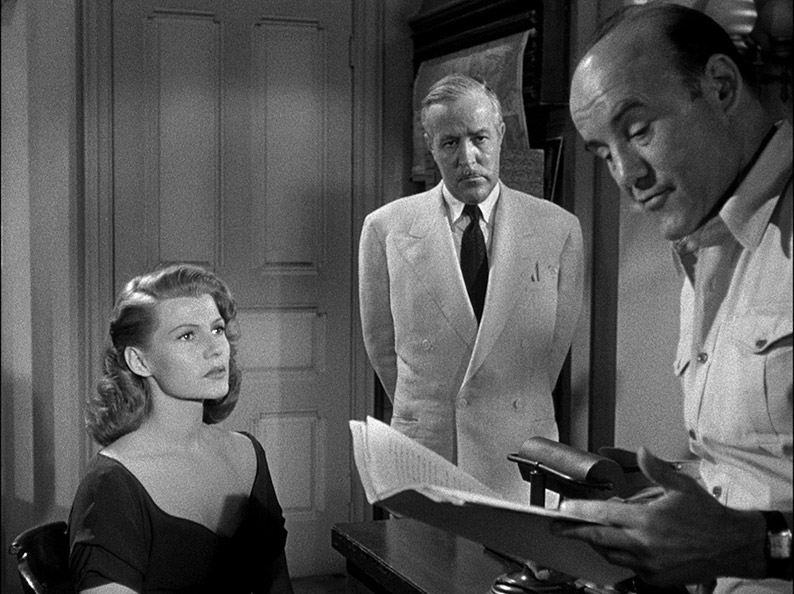
If I was forced at gunpoint to pick my least favourite film in this Columbia Noir box set then I’m fairly certain that Affair in Trinidad would be it. That doesn’t mean I didn’t enjoy it because I did, but stood against the likes of Framed and The Mob it’s a somewhat more pedestrian affair, entertaining but lacking the plot twists and cinematic urgency of those two altogether more hard-boiled treats. It certainly took me a while to engage with the two leads. That Steve and Chris get the hots for each other so quickly after Neil’s death is in some ways par for the Hollywood rapid-romance course, a tradition that can see two people meet, fall in love and marry in the space of about ten minutes of screen time. Some credence is leant to the romance by the news that Chris long ago fell out of love with Neil and that they have for some time been sleeping in sperate rooms, and her attraction to his brother – a man who probably resembles him but who is kinder to her – is thus understandable. You can make your own judgements about the speed with which Steve gets the hots for his only recently deceased and beloved brother’s wife. It’s also a little odd that the very thing that kicks off the plot turns out to be a bit of a McGuffin, bringing Steve to the island and pointing him and Chris in the direction of the villain of the piece but ultimately not addressed in any meaningful way. By the time we get to the finale, poor Neil has become an almost forgotten background detail, even by those he was theoretically close to.
Hayworth and Ford are both on good form here, though Ford is hampered by having to play a character who gets impossibly jealous of a women he’s only known for a few days at the drop of a hat, which does intermittently make him seem like a bit of a git. Alexander Scourby is smoothly oily as Max Fabian, a wealthy and amoral twerp who is confirmed even before the halfway mark to be up to no good and by the end has become worthy of any dark twist of fate he might suffer. That said, he can still be intimidating when required – when Chris opens a door to reveal a stern-face Fabian flanked by two recruits to his cause in the shape of Walters (Karel Stepanek) and Dr. Franz Huebling (George Voskovec), I actually gave a start, despite predicting in advance that he was going to be there. The biggest acting pleasures, however, lie in the female members of the supporting cast, with Valerie Bettis most entertaining as Huebling’s cheerily drunken wife Veronica, while the film’s most authoritative performance comes from Juanita Moore as Chris’s world-wise maid Dominique.
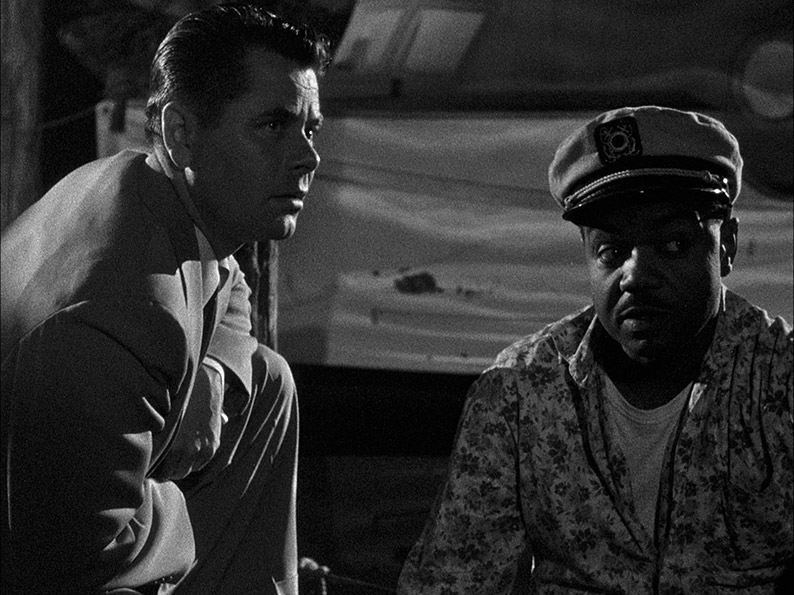
Although made by Hayworth’s production company, she herself expressed unhappiness with both the script (to which at least four writers contributed) and the finished film, which she regarded as a shabby rehash of her rightly celebrated 1946 Gilda, in which she also co-starred with Glenn Ford. The similarities are there, but while Affair in Trindad can’t really hold a candle to that earlier classic, I’d also argue that it’s different enough from it to stand on its own merits, and Hayworth’s performance never betrays her unhappiness with the material. There are good scenes, fine performances, and cinematographer Joseph Walker’s atmospheric lighting and camerawork helps the film to earn its noir classification. There are real pleasures here, but I have to admit that it’s probably the film in this set that I’ll be revisiting the least.
District Attorney Lloyd Hallett (Edward G. Robinson) has been trying to nail notorious Italian mobster Benjamin Costain (Lorne Greene) and finally has a witness who is prepared to testify in the shape of Pete Tonelli (an uncredited Alfred Linder). Just as Tonelli is mounting the steps to the courthouse with his police escorts, however, he is shot and killed by a unseen sniper. Hallett’s last hope of a conviction lies with Sherry Conley (Ginger Rogers), a brash blonde who used to hang out with Costain and presumably knows a few incriminating things about him but who is now serving time for an unrelated offence. He thus has her taken out of prison and escorted by detective Vince Striker (Brian Keith) and prison warden Mrs. Willoughby (Katherine Anderson) to a plush hotel suite, where he plans to persuade her to testify against Costain. She’s not interested in putting her life on the line, but in the course of her time at the hotel, she and the initially frosty Vince start inadvertently falling for each other.
If that doesn’t sound like a plot for a noir thriller then that’s because for much of its running time Tight Spot doesn’t play like one, despite being directed by Phil Karlson of Scandal Sheet, Kansas City Confidential and The Phenix City Story fame. It certainly starts in convincingly noirish fashion, with Tonelli’s shooting fast cut with possible windows from which the shot could have been fired, and a slickly handled sequence in which Vince has to lose a car that is chasing the one in which he is transporting Sherry. But once they get settled in the hotel suite there is a noticeable adjustment in the tone and even the directorial style. With much of the action confined to this single location, almost all of the wide shots are shot from a similar angle, which hints heavily at the film’s stage play origins and occasionally has the feel of a live television melodrama. Not that there’s technically anything wrong with confining your characters to a single location, even for an entire film if the script and performances are sharp enough. And here, well…
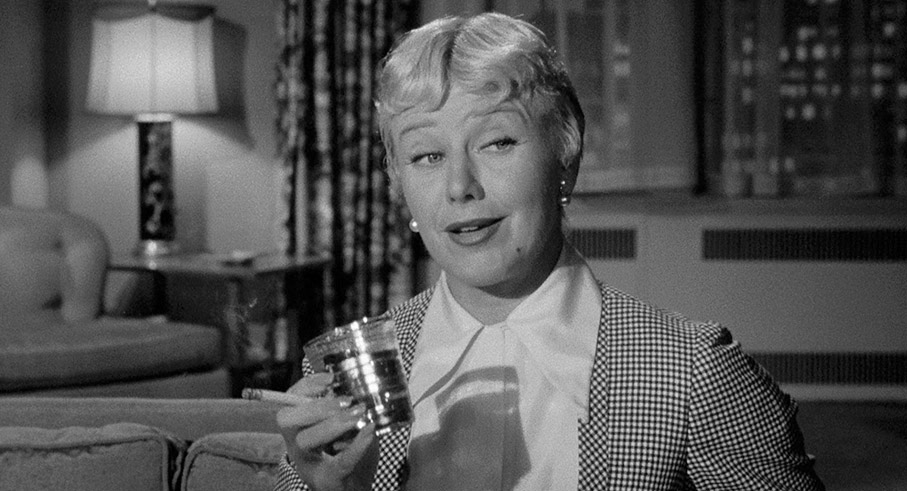
Okay, we’re firmly in the realm of personal taste here, and I know that others will disagree with me on this, but for me the dialogue doesn’t quite crackle to the degree that its delivery suggests it should. Smart remarks are made and they prompt snappy responses, but they rarely made me smile in the way that genuinely sharp banter from this period so often does. This is particularly surprising given that the screenplay was by William Bowers, whose scripts for The Mob and 5 Against the House boasted some of the sharpest dialogue in any of the films in these Columbia Noir sets, which made me wonder how faithful he was being to Lenard Kantor’s source play, Dead Pigeon. It probably doesn’t help that Ginger Rogers sometimes overplays her role as sassy blonde Sherry, adding a screwball comedy element to a character that would work better if more reality-grounded. This is highlighted further by Brian Keith’s more low-key performance as Vince and the naturalism of Katherine Anderson’s portrayal of Willoughby. And Rogers knew how to play sassy to perfection, as anyone who’s seen her glorious performance in the hilarious Roxie Hart will testify.
Yet when I watched the film a second time after listening to Nora Foire’s commentary, I found myself seeing these scenes in a slightly different light, as I took on board the notion that the exaggerated elements of Rogers’ portrayal were themselves part of a performance put on by Sherry in her attempt to convince the world that she is tougher and more self-confident than she really is. The dialogue still doesn’t quite snap as it should, and there are moments when Rogers still plays to the gallery (leaning right over in the car put her face almost up against the speedometer to express her alarm is the stuff of cartoons – I’m surprised her eyes didn’t pop out on stalks), but it made the hotel scenes work better for me than they had done on my first viewing, and oddly also seemed to shorten their length. Credence to this reading of Sherry’s character comes when an attempt is made on her life, a thrillingly handled sequence that marks a turning point for the drama and includes a dark surprise for which you can see the groundwork being subtly laid on a second viewing. When injured, Sherry’s former bravado completely crumbles, and the when the full consequences of the attack hit home, the effect on her is devastating. Even before this there are signs of the more sensitive woman she may be beneath the bluster, most visible in her reflective response to Willoughby’s comment about the need the women in her charge have for love.
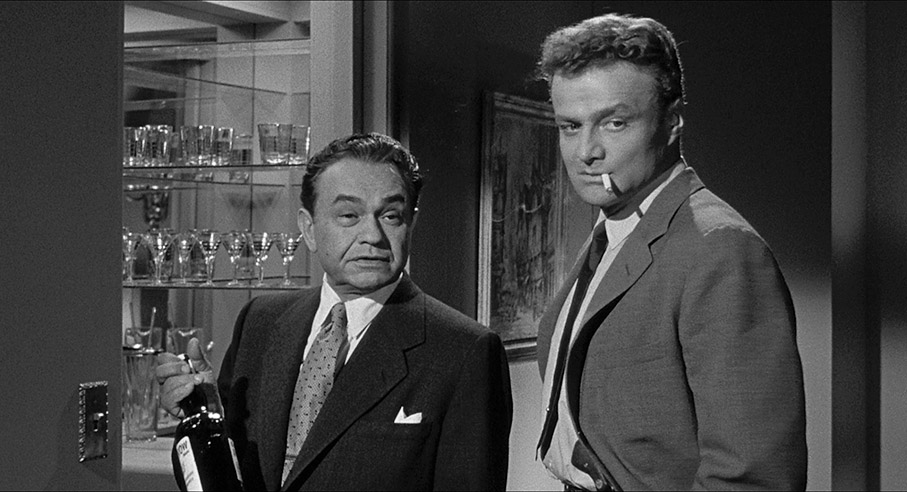
That there’s a twist of some sort coming seems inevitable given how things begin to play out, but when it arrives it’s a good one that even initially misdirects us about its nature and gives rise to the film’s most grippingly directed scene, one that alone would earn the film its noir credentials. From this point on the whole balance of the drama is altered and builds to a climax as tense and well-handled as any in this collection. There's an emotionally fiery scene when Sherry is borught face-to-face with her unsympathetic sister Clara (Eve McVeagh) that may be the best dialogue-driven drama in the film, and there's something almost surreal about a running gag involving a bizarre TV telethon being run by a country-and-western singer named Mississippi Mac (Doye O’Dell). And for all my complaints about sub-sparky dialogue, there is one priceless exchange that genuinely made me laugh out loud. After a ditzy couple whose apartment has been invaded by potential assassins are questioned, one of them comments on the blood on the newly arrived Vince’s shirt. Vince responds with deliciously deadpan sincerity, “I took two bullets through the chest, ma’am. Just routine,” to which his colleague then dryly adds after Vince has departed, “It was actually three bullets, ma’am. We haven’t told him yet.”
| MURDER BY CONTRACT (1958) |
|
A young man named Claude (Vince Edwards) shaves and dresses in his boarding house room, and a short while later is ringing the doorbell of an apartment, which is answered by a man named Mr. Moon (Michael Granger). Claude gives his name but it makes no impression, then tells Moon that he has an appointment and that it was made by a Mr. Brink. Moon invites him in, and once seated Claude politely informs his host that he’d like to work for him. Moon continues to calmly assure Claude he doesn’t know what he means. He’s a retired real estate broker, he tells him, but Claude says he’d like to work for him anyway as a contractor, a job he admits to never having done before. Even though it’s never explicitly stated during the course of their conversation, we’ve all seen enough movies to know that Claude is looking to work for Moon as a hit man. Well, that and the sizeable hint provided by the title. In many ways Claude is an unusual candidate for this role. He already has a good job with a decent salary and a pension plan, but wants to buy a particular house that is out of his financial reach so has decided to become a professional killer in order to more quickly make the money to pay for it. On hearing this, Moon assures Claude that Mr. Brinks was kidding and brings the meeting to a close, but as the still cordial Claude reaches the door and thanks Moon for his time, Moon asks for his phone number and tells him he may call him sometime, maybe tomorrow, next week or next month. “If you’re not in, I won’t call back,” he warns him.
There are some films that grab you in their opening minutes and do so without even a hint of a bang, and for me, Murder by Contract is absolutely one of them. The matter-of-fact way Claude dresses as the titles unfold, the non-noir guitar score that has more than a whiff of The Third Man about it, the offbeat framing of Lucien Ballard’s camera once Claude is seated in Moon’s apartment – all these things tell us that this is not going to be a standard noir thriller. And then there’s Claude himself, well turned-out, good-looking and polite, a young professional who seems to have decided to become a hired killer almost on a whim, but conversely appears to also have thought it through thoroughly and mentally prepared himself for what lies ahead. “You can only make a mistake once in this job,” Moon tells him in the only admission he makes that Claude has come to the right place. These turn out to be prophetic words.
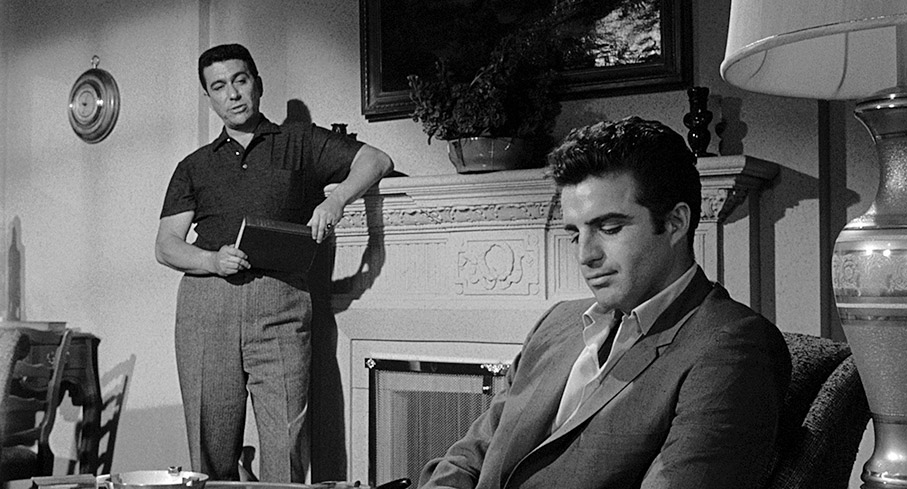
As soon as he departs, Moon calls the aforementioned Brink, who convinces him that Claude is someone they could make use of. The film then takes the next of a whole string of bold chances when instead of cutting straight to the phone call that will bring Claude into the fold, it instead calmly observes him waiting for it to happen, day after day, as he passes the time by doing exercises and having meals brought to his room, which he never leaves. It’s a sequence whose influence on the later Taxi Driver is clear, and has been acknowledged as such by that film’s director, Martin Scorsese, who provides an enthusiastic introduction on this very disc. When the call eventually comes, Claude goes to work, and again is shown to be unusual for a man in his profession in his dislike of guns and his refusal to use them. Instead he calmly makes use of whatever tools are available at the location of the hit, a cut-throat razor at a barbershop or the oxygen tube keeping a critically injured man alive. One time he does use a knife, but this is for a very special hit I have no intention of spoiling.
All of this is effectively build-up to a job in Los Angeles that will change the trajectory of Claude’s life and career, one on which he is constantly accompanied by two minders, the irritable Marc (Phillip Pine) and the calmer and more relaxed George (Herschel Bernardi). We first meet them as they sit in their convertible and Marc gripes about Claude’s decision to travel to Los Angeles by train instead of flying, in the process eating up three days of their two-week schedule. When Claude arrives he gives Marc further cause for irritation when instead of being taken to his hotel room he asks his minders to show him the sights. Indeed, as the days tick by, Claude appears to be treating the job more as a holiday by the sea, enjoying the pleasures offered by his location and never once asking about the target he is being paid to hit, which has the effect of winding Marc up to the point where he looks set to explode. As it turns out, there is method in Claude’s madness, but once the target is revealed, his exterior calm quickly collapses.
Quite how much to say about the target in question is a tricky call, in part because even the shortest synopses I’ve read tend to give away what so infuriates Claude but rarely why, and by omitting that second piece of information they end up being inadvertently misleading. Thus I feel the need to clarify matters in order to discuss how the film plays out, so if you do want to go in cold then I’d bypass the next paragraph or click here to automatically do so.
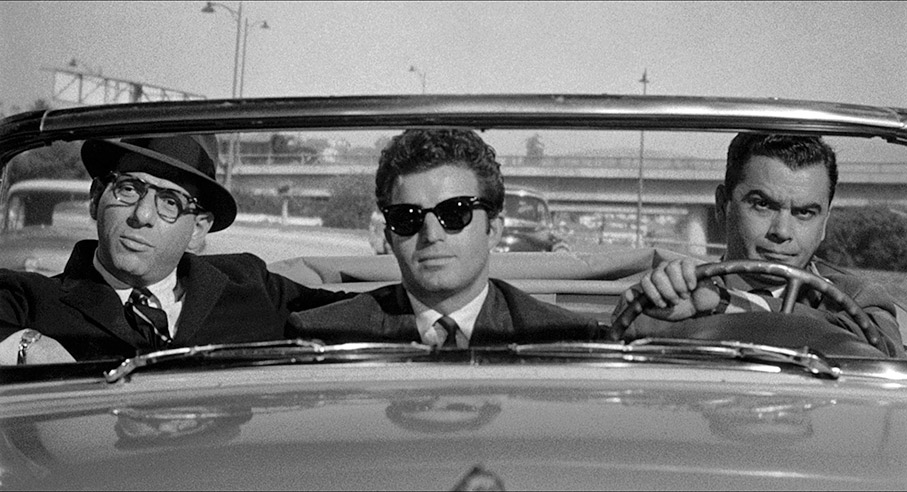
Okay, to illustrate what I mean, here’s the short synopsis from the top of the film’s IMDb page: “Claude is a ruthless and efficient contract killer – until he finds his next target is a woman.” Now I’m guessing that many reading this will assume that despite the coldness with which he carries out his assigned hits, Claude still has a conscience and draws the line at killing a woman. I certainly did. And frankly, that’s an all-too common trait designed to humanise an antihero and keep the audience on his side. Yet here this is not the case at all. Claude’s anger stems not from some hitherto unexpressed moral code, but from his conviction that women are unpredictable and do not follow patterns in the same way as men, and as a result are far harder to plan the successful assassination of. He’s pissed off because had he been told up front that the target was a woman he’d have demanded a far higher fee. It doesn’t help that the woman in question, a Federal witness named Billie Williams (Caprice Toriel), never leaves her house and has a constant police guard, and little does Claude know that she is also in a fragile emotional state, fearful for her safety and getting seriously tetchy from cabin fever. She also proves every bit as difficult to dispatch as Claude had predicted, and after being presented as a coolly efficient and self-confident killer in the first half of the film, in the second he becomes a more easily rattled operative who is forced to improvise answers to questions that he failed to predict would be even be raised. Here we get to see a very different side of Claude than the epitome of unflappable cool we were presented with in the early scenes, and these sequences have their own specific pleasures, as we watch Claude make preparations and carry out tasks whose purpose only becomes clear when his plans are later put into action.
Murder by Contract is in some ways the wild card in this collection, a film with a strong indie sensibility that is nestled amongst five unmistakably studio productions. It has the locational lack of glamour and the everyday realism of a film like The Honeymoon Killers and is all the more troubling for it. There are even shots here that have a strong documentary vibe, including a visit to what looks like a real a gun shop whose establishing shot looks almost as if it was shot surreptitiously. That we genuinely don’t know what Claude is up to when he first arrives and is seemingly ignoring the hit he is in town to make in order to go swimming or scuba diving also makes it hard to predict where the film will go next. I certainly found myself oddly fascinated by Claude, who makes for a genuinely intriguing if chilling antihero, and at one point I did catch myself getting quietly urging him to engage with the job at hand, not because I shared the increasingly irritable Marc’s frustration but because I was invested enough in Claude by this point to not to want to see him screw up and pay the price. I’m not completely comfortable with what that says about me and my relationship to the character, but it’s the sort of discomfort I too rarely feel and which me is a clear indication that a filmmaker of rare vision and daring is doing his or her job.
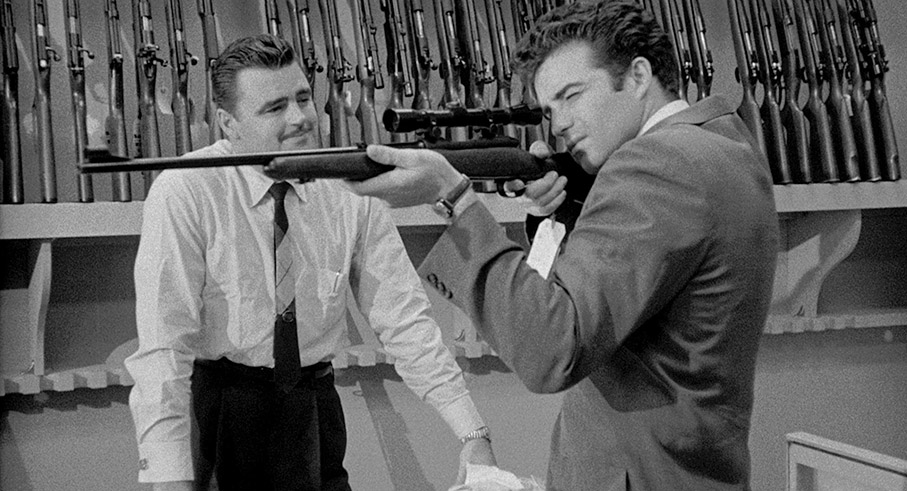
Vince Edwards, who three years later would achieve widespread fame as the idealistic neurosurgeon Ben Casey in the hugely popular TV series bearing that character’s name, is perfect casting as Claude, his handsome face and lifeguard physique kicking against the traditional notion of how a cold-hearted killer should look, and more closely aligns him with the young spree murderer of Peter Bogdanovich’s electrifying debut feature, Targets. A fine supporting cast has several standouts, with Phillip Pine and Herschel Bernardi engagingly chalk-and-cheese as Marc and George, but despite the smaller role they play in the story, it’s the women who make the strongest impression here. Caprice Toriel is convincingly tormented as Billie, particularly in her introductory closeup as she pounds at the piano in an attempt to distract herself from the mental anguish of her situation; Frances Osborne does a gloriously funny dejected drunk act as Miss Wiley, the former maid of Claude’s latest target; and Cathy Browne feels disarmingly real as Mary, a professional escort whose feelings are hurt when Claude has a change of mind and sends her on her way.
I genuinely wasn’t ready for how blown away I would be by Murder by Contract, an advantage, perhaps, of knowing so little about it in advance of sitting down to watch it. By climbing inside the mind of a cold-hearted professional killer and aligning us with him, the film feels as seductively dangerous for its time as Taxi Driver did in 1976. Nowhere is this more evident than in the second half, which is primarily focussed on Claude’s efforts to dispatch his assigned victim, and I found myself torn between wanting him to succeed against the odds and not wanting harm to come to his target, a dichotomy that peaks in a genuinely tense final scene. It’s rivetingly directed by Irving Lerner, whose background in documentary is doubtless responsible for the sometimes disconcerting air of realism, while Lucien Ballard’s cinematography largely eschews expressionist noir lighting in favour of showcasing the everyday nature of the world in which the characters move and work. Everything clicks in this rare example of a studio film that feels every inch the work of talented young, European cinema-influenced independent filmmakers – the fact that it was apparently shot in just seven days on a low budget only serves to enhance this sensation. There are some terrific films in this box set, but if I had to pick a favourite, Murder by Contract would have to be it.
Part 2: Tech Specs, Special Features and Summary >>
|